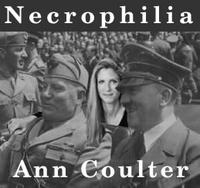I know life is unfair, and that there are always going to be those who are the haves and have-nots. I also know that a lucky few will always reap the inevitable profits of war.
But Iraq seems different. Maybe it isn’t, but something about the profiteering seems shameless, in-your face, almost sneering at us little guys. I mean, do you have any idea how many members of Bush’s entourage, former members of his cabinet, current and former Bush cronies are about to mop up obscene amounts of money in Iraq?
Chances are if you visit this site you read Josh Marshall’s. In case you don’t, please go and read his masterful sleuthing of what’s going on over there. And read every link in that post. Links about companies like New Bridge Strategies.
What you’ll encounter is worse than obscene, it is truly sickening. And it is symptomatic of something unique to the Bush administration: a gleeful, delirious worship of the dollar, to the point that those intimately associated with Bush feel free to brazenly show us all how they are lining their pockets, selling their “influence” and “connections” — “I know Bush & Friends and I can make you rich, rich beyond your wildest dreams.”
I know all about paying people for influence. It’s an old practice that we professionals categorize under the bland term “public affairs.” But this is different. Public affairs has always been associated with subtlety, a high degree of tact and propriety and professionalism. What we are seeing now is whoring, plain and simple. And the whores are Bush’s friends and advisors. And we just shrug and mutter that we can’t fight city hall….
These posts of Marshall’s should be required reading for anyone who remains equivocal about our president and what he stands for. If Bush wanted to, he could insist it be stopped. He could tell his dear friends that if they behave like whores they will wield no influence. But whoring is what Bush is really all about, and I suspect he sees absolutely nothing wrong with it. It’s what his tax cuts are all about, and his energy policy and everything else about him — alms for the rich. Breaks for his cronies.
At a time when Americans are losing jobs in record numbers, at a time when a lot of people are looking for help and wondering what their future will be, this should be devastating news: mountains of wealth, virtually inconceivable to us ordinary people, are going to be made by companies frantic to tap into that $87-billion wad Bush is waving in front of them. To get at it, these companies will do business with the devil — our president’s friends and advisors, who have no compunction about whoring themselves in public, on Web sites, in advertisements.
I can’t really put into words how furious this makes me. I am only depressed at the relative silence this topic has thus far evoked. I just thank god we have people like Marshall, who take it on themselves to shine light under the rock and show the world what Bush’s maggots there are up to.
Iraq may be flypaper for freaks, but the Bush administration is flypaper for pigs, chortling, filthy, stinking and shameless.

Comment